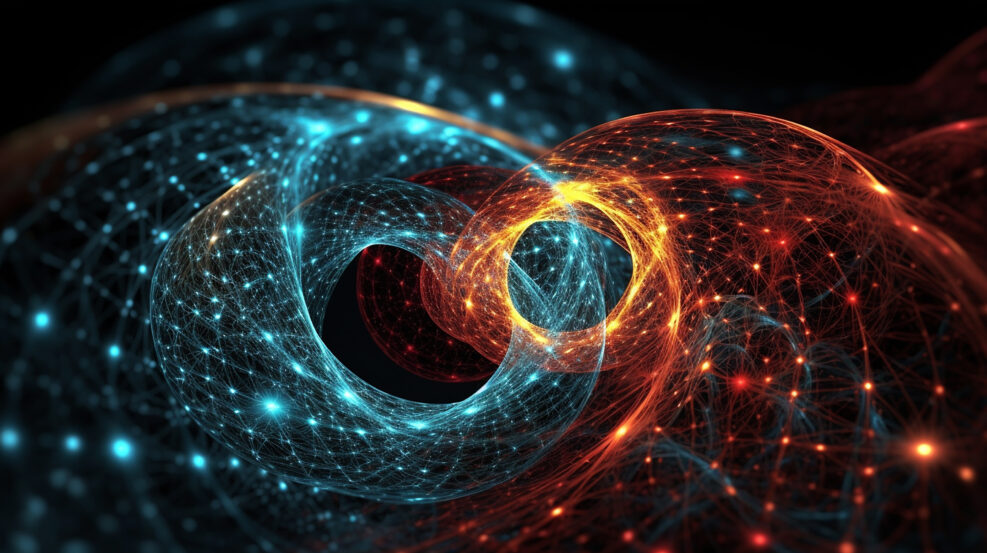
TagRoger Penrose


Why the Human Mind Cannot Be Reduced to A Mathematical System
Philosophers Roger Penrose and J.R. Lucas walk us through an argument based on Gödel’s incompleteness theorem
The New Book on the Big Bang that Roger Penrose is Praising
Meet the forgotten men who discovered evidence for an expanding universe.
The Theory That Consciousness Is a Quantum System Gains Support
Hameroff and Penrose’s Orch Or Theory sees consciousness as the outcome of a quantum collapse of a wave function
The Search for Extraterrestrial Life 18
We are starting to find more different kinds of exoplanets and an unexpected source of water on MarsIn our universe: Time travel? “How a Rotating Universe Makes Time Travel Possible” At Universe Today, Stony Brook astrophysicist Paul Sutter notes that mathematical philosopher Kurt Gödel (1906–1978) wrote a model for Albert Einstein (1879–1955) of a universe that allows time travel into the past: “Gödel constructed a relatively simple and artificial model universe to prove his point. This universe is rotating and contains only one ingredient. That ingredient is a negative cosmological constant that resists the centrifugal force of the rotation to keep the universe static. / Gödel found that if you follow a particular path in this rotating universe you can end up in your own past. ” (January 11, 2023) Our universe, as it happens, is not Read More ›

How Surreal Artist MC Escher Influenced Physicist Roger Penrose
Escher’s mathematical art was all the more remarkable because he had no formal training in mathematicsLast month, Robert Lawrence Kuhn interviewed eminent British mathematical physicist Sir Roger Penrose on a number of topics, including the influence of surrealist artist M. C. Escher (December 9, 2022/32:00 min). Here is a transcribed selection from the second part of the discussion in Part 1 above*, beginning around the 12-minute mark, with some notes: Robert Lawrence Kuhn: We talked about the impossible Penrose triangle which really opens up another area of your life in terms of visual representations of remarkable things. Penrose tiling really new ways of thing of seeing visual representation of fiery fundamental geometric and algebraic transformations and things. But what I wanted to ask you is, as youdeveloped that you had this interaction with the artist Read More ›

Nobelist Roger Penrose Talks About His Impossible Triangle
At Closer to Truth, the mathematical physicist explains to Robert Lawrence Kuhn how he understands the relationship between mathematics, the mind, and the physical worldLast month, Robert Lawrence Kuhn interviewed eminent British mathematical physicist Sir Roger Penrose on the relationship between mathematics, the mind, and the physical universe (December 9, 2022/32:00 min). Penrose likes to illustrate the relationship between the three with an “impossible” triangle (see below). Here are a couple of transcribed selections from the first part of the discussion in Part 1*, concerning the Penrose Triangle, with some notes: Robert Lawrence Kuhn: Let’s start with your grand metaphysical framework, your three worlds — three mysteries: the physical world, the mental world, the platonic or mathematical world — each connected to the other two in your famous diagram of an equilateral triangle. What’s the origin of this vision of yours of foundational reality? Read More ›

Chalmers and Penrose Clash Over “Conscious Computers”
Philosopher Chalmers thinks computers could be conscious but physicist Penrose says noTwo authors I’ve been reading recently are Roger Penrose and David Chalmers. Penrose is a physics Nobel laureate who has stoked controversy by claiming in The Emperor’s New Mind: Concerning Computers, Minds and The Laws of Physics (1989) that the mind can do things beyond the ability of computers. Chalmers is a philosopher of science who claims in The Conscious Mind: In Search of a Fundamental Theory (1997) that consciousness cannot be reduced to physical processes. Both thinkers are well respected in their fields, even though they articulate positions that imply that the mind’s operation is beyond current science. At the same time, they believe that there is a way to see the mind as part of nature (that is, Read More ›

Some Say That the Universe Is a Donut. Others Say It’s a Hole.
Actually, as astrophysicist Ethan Siegel points out, there’s only one universe — which makes theorizing about it a problem.At Forbes, theoretical astrophysicist Ethan Siegel comments: The true problem with the Universe is that there’s only one to observe, or at least, only one that we’re capable of observing. We don’t have a large sample of Universes to compare between, and we don’t have a large set of data points available to us within our Universe. It’s like rolling five dice, together, once. Your odds of getting all sixes is small: about 1-in-7800. Yet if you rolled five dice at once and saw that it came up all sixes, you wouldn’t necessarily conclude that it was anything more than random chance. Sometimes, nature just doesn’t give you the most likely outcome. It’s possible that the leftover photons from the Read More ›

Chicken Little AI Dystopians: Is the Sky Really Falling?
Futurist claims about human-destroying superintelligence are uninformed and irresponsibleThe article “How an Artificial Superintelligence Might Actually Destroy Humanity” is one of the most irresponsible pieces about AI I have read in the last five years. The author, transhumanist George Dvorsky, builds his argument on a foundation of easily popped balloons. AI is and will remain a tool. Computers can crunch numbers faster than you or me. Alexa saves a lot of time looking up results on the web or playing a selected tune from Spotify. A car – even a bicycle – can go a lot faster than I can run. AI is a tool like fire or electricity used to enhance human performance and improve lifestyles. Like fire and electricity, AI can be used for evil or Read More ›

Can Quantum Mechanics Help Decipher Consciousness? Free Will?
Nobel laureate Roger Penrose, among others, looked to the quantum world for modelsIn Walter Bradley Center director Robert J. Marks’s second podcast with philosopher Angus Menuge, the big topic is the perennial “Hard Problem of consciousness and various proposed solutions. One of the questions that often comes up is quantum consciousness. Earlier, they had discussed Integrated Information Theory (IIT) and panpsychism. But now, what about recent Nobelist Roger Penrose’s approach: quantum consciousness? https://episodes.castos.com/mindmatters/Mind-Matters-134-Angus-Menuge.mp3 This portion begins at 18:22 min. A partial transcript, Show Notes, and Additional Resources follow. Robert J. Marks (pictured): Okay. Another model of consciousness of which I am aware is so-called quantum consciousness. I’m really interested in this because reading the works of Roger Penrose, he maintains that humans can do non-algorithmic things. And he looked around at the Read More ›

Why Human Creativity Is Not Computable
There is a paradox involved with computers and human creativity, something like Gödel’s Incompleteness Theorems or the Smallest Uninteresting NumberIn last week’s podcast, “The Chaitin Interview IV: Knowability and Unknowability,” Walter Bradley Center director Robert J. Marks interviewed mathematician Gregory Chaitin, best known for Chaitin’s Unknowable Number, on a number of things, including whether computers can show creativity. Chaitin has thought a lot about that: https://episodes.castos.com/mindmatters/Mind-Matters-127-Gregory-Chaitin.mp3 This portion begins at 21:34 min. A partial transcript, Show Notes, and Additional Resources follow. Robert J. Marks: We’re talking, just in general, about the unknowable. Roger Penrose recently won a Nobel Prize for his work with Stephen Hawking on black hole theory. He also wrote a book called The Emperor’s New Mind: Concerning Computers, Minds and The Laws of Physics (1989) and he followed it up with The Shadows of the Mind: Read More ›

The Aliens Exist—But Evolved Into Virtual Reality at a Nanoscale
That’s the Transcension Hypothesis, the latest in our series on science fiction hypotheses as to why we don’t see extraterrestrialsReaders will recall that we have been looking at science writer Matt Williams’s analysis of the various reasons that we do not see extraterrestrials except at the movies. Last week, we looked at the Firstborn Hypothesis: We don’t see aliens because they haven’t evolved yet. And, when they do, we must be careful not to harm their development through colonization. This week is a bit of a deeper dive: The extraterrestrials have evolved so far beyond us that perhaps we could not encounter them. … the Transcension Hypothesis ventures that an advanced civilization will become fundamentally altered by its technology. In short, it theorizes that any ETIs that predate humanity have long-since transformed into something that is not recognizable by Read More ›

Why a Science Fiction Writer Thinks Life Is More Than Just Matter
Many animals and even bacteria show behavior that smacks of thinking, he says
How Can You Talk to Yourself?
If your mind is one, how can it talk to itself? What will artificial intelligence be like in the future. Dr. Geoffrey Simmons and Dr. Robert J. Marks discuss the mind, artificial intelligence, and Dr. Simmons’ book Are We Here to Re-Create Ourselves?: The Convergence of Designs. Show Notes Additional Resources

Should AI Hold Patents? The Flash-of-Genius Answer
To understand why AI cannot independently invent, let’s look at how famous inventors have actually done itLike Excel, AI assists programmers in their design work. AI can search through trillions of possibilities, using data from a million sources, to find a successful design. But the structure of the search and the source of the data is the choice of the programmer. A look at how famous inventors developed products that changed the world sheds some light on the process.
Read More ›
Moore or Less: Why the Exponential Speed of AI Can’t Be Sustained
Faster computers only help the performance of AI algorithms that require search marginally.Exponential growth is often the beginning of a sigmoid or s-shaped curve where growth that appears to be exponential but eventually slows and reaches a saturation point. We see this in nature, for example, in bacteria.
Read More ›
Why Some Scientists Believe the Universe Is Conscious
They’re not mystics. But materialism is not giving good answers so they are looking aroundThese prominent thinkers are driven to panpsychism because materialism about the mind doesn’t really work. So if panpsychism ends up seeming absurd, dualism—there really is an immaterial world—is also worth considering.
Read More ›
The Mind Can’t Be Just a Computer
Gödel demonstrated that fact and Turing tried to live with itKurt Gödel (1906–1978) proved that there are truths in mathematical logic that lie outside mathematical logic, which means that the mind cannot be understood simply as a computer.
Read More ›
Quantum Randomness Gives Nature Free Will
Whether or not quantum randomness explains how our brains work, it may help us create unbreakable encryption codesWhen I was boy, my father explained free will and predestination to me: I dig a fence post hole. · Did I create the hole because of my own free will? · Or was the hole already there and I simply removed the dirt? If true, the hole was predestined. The question cannot be answered by examining the evidence. In philosophy terms, it is “empirically unanswerable.” That is the sort of stuff that philosophers debate. Religious people might point to scripture to support one conclusion over the other.1 In physics, however, quantum randomness offers a definitive answer to the question of predestination vs. free will—for subatomic particles. In the world of classical physics (Isaac Newton’s physics), it can be argued Read More ›